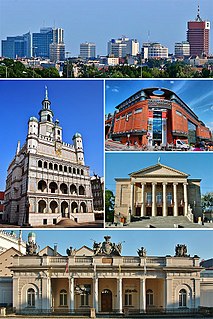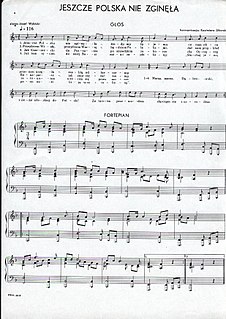
"Mazurek Dąbrowskiego", also known by its incipit, "Poland Is Not Yet Lost" ("Jeszcze Polska nie zginęła"), is the national anthem of Poland.
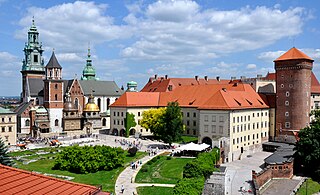
Poland is a part of the global tourism market with constantly increasing number of visitors. Tourism in Poland contributes to the country's overall economy. The most popular cities are Kraków, Warsaw, Wrocław, Gdańsk, Poznań, Szczecin, Lublin, Toruń, Zakopane, the Salt Mine in Wieliczka and the historic site of Auschwitz – A German nazi concentration camp in Oświęcim. The best recreational destinations include Poland's Masurian Lake District, Baltic Sea coast, Tatra Mountains, Sudetes and Białowieża Forest. Poland's main tourist offers consist of sightseeing within cities and out-of-town historical monuments, business trips, qualified tourism, agrotourism, mountain hiking (trekking) and climbing among others.

Stanisław Mateusz Ignacy Wyspiański was a Polish playwright, painter and poet, as well as interior and furniture designer. A patriotic writer, he created a series of symbolic, national dramas within the artistic philosophy of the Young Poland Movement. Wyspiański was one of the most outstanding and multifaceted artists of his time in Poland under the foreign partitions. He successfully joined the trends of modernism with themes of the Polish folk tradition and Romantic history. Unofficially, he came to be known as the Fourth Polish Bard.

Rota is an early 20th-century Polish poem, as well as a celebratory anthem, once proposed to be the Polish national anthem. Rota's lyrics were written in 1908 by activist for Polish independence, poet Maria Konopnicka. The music was composed two years later by composer, conductor and concert organist, Feliks Nowowiejski.

Jan Wiktor Kiepura was a Polish singer (tenor) and actor.
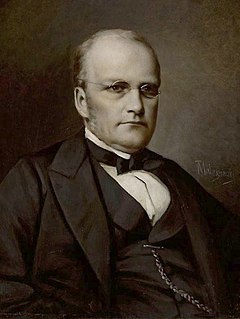
Stanisław Moniuszko was a Polish composer, conductor and teacher. He wrote many popular art songs and operas, and his music is filled with patriotic folk themes of the peoples of the former Polish-Lithuanian Commonwealth.
Bohdan Wodiczko was a Polish conductor and music teacher.

Polish opera may be broadly understood to include operas staged in Poland and works written for foreign stages by Polish composers, as well as opera in the Polish language.

The Kraków Philharmonic, is the primary concert hall in Kraków, Poland. It is one of the largest auditoriums in the city. It consists of the main hall for orchestral performances with 693 seats, and two smaller venues, the Golden Hall and the Blue Hall, for chamber music concerts.
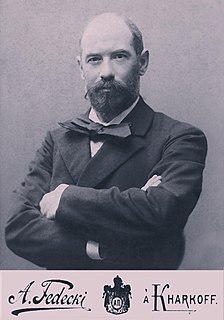
Konstanty Antoni Gorski was a Polish composer, violinist, organist and music teacher.

This is a list of Polish national and patriotic songs.
The Stefan Jaracz Theatre in Łódź, Poland is the oldest theatre in the region. It is a repertory theatre subordinate to the Marshall Office of the Łódź Voivodeship. During the years 1888-1949 it was known as the Polish Theatre and the City Theatre.
Henech Kon or Henryk Kon (1890–1972) was a Polish cabaret performer.

Joanna Woś is a Polish operatic coloratura soprano.

The Kraków Philharmonic Orchestra or the Symphony Orchestra of the Karol Szymanowski Philharmonic is a professional symphony orchestra based in Kraków, Poland. The national status of the orchestra is reflected in its program of events, including weekly symphonic concerts in the Wawel Royal Castle, or at the Jagiellonian University famous Collegium Novum, and at prominent Kraków churches. The company is more active professionally than any other philharmonic orchestra in the country.
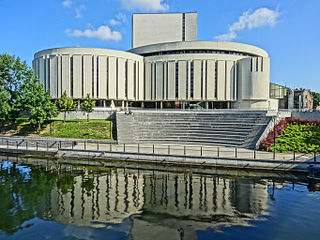
The Opera Nova is an opera house located in Bydgoszcz and established in 1956, which also plays the role of a musical theater. It is one of the 10 opera houses in Poland and the only one of this size in the Kuyavian-Pomeranian Voivodeship. Opera Nova also welcomes the scene of the Bydgoszcz Buratino Puppet Theatre.

The Arthur Rubinstein Music Schools Group is an association of music schools of primary and secondary education which seat is located in the building at Szwalbego Street 1 in Bydgoszcz.
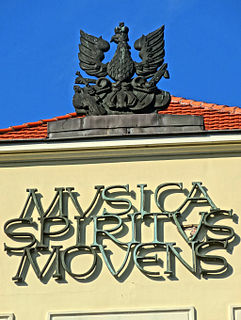
The Bydgoszcz Academy of Music is a Polish state music university located in downtown Bydgoszcz. Its origins date back to 1974, as Branch of the High School of Music in Lodz till 1979. From 1979 to 1981, it was established as Bydgoszcz State Higher School of Music, comprising for four departments. Since 1981, it is called Academy of Music - "Feliks Nowowiejski".


